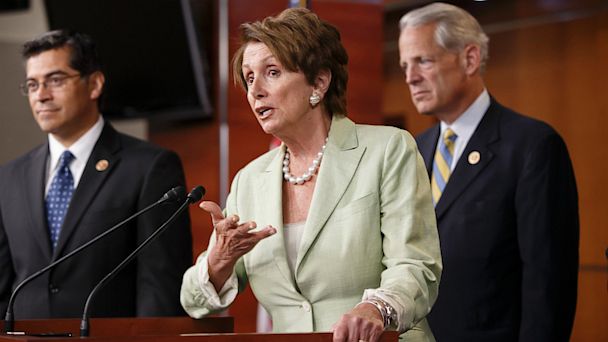A Skeptical Congress Promises To Keep A Close Eye on Russia-Syria Diplomacy

J. Scott Applewhite/AP Photo
The U.S. Congress is standing down on votes to authorize military force against Syria while the Obama administration attempts to solidify an international agreement in which the Assad regime would give up its chemical weapons stockpiles.
But many members of Congress are skeptical that the potential diplomatic solution will succeed. Given the stakes of U.S. involvement in a Syrian civil war, however, some are open-minded about the Russian proposal if it means avoiding missile strikes that the president has threatened to unleash in order to degrade the Syrian military capabilities.
"What the Russians have proposed may turn out to be the best thing to come out of Russia since vodka," Rep. Brad Sherman, D-Calif., told reporters after a classified briefing on Wednesday. "An imperfect implementation of the Russian proposal is far better than a perfect implementation of an airstrike campaign."
Senate leaders and the White House came to an agreement "on a way forward" after the president's appeal to the nation and Congress Tuesday, Senate Majority Leader Harry Reid said. The Nevada Democrat said the Senate will turn its attention to an energy bill and not "tread water" on Syria.
But Reid issued a warning to Syria and Russia that the U.S. Congress will keep a close eye on the progress of negotiations and will be willing to authorize the use of force if the diplomatic solution falters.
"[We'll] see what we can to do to give the president the time and space our country needs to pursue these international negotiations," Reid said on the Senate floor on Wednesday. "America must be willing to be vigilant and ready to use force if necessary, and Congress should not take the threat of military force off the table.
"Leaders in Damascus and Moscow should understand that Congress will be watching these negotiations very closely," Reid added. "If there is any indication these are not serious, that it's a ploy to delay, to obstruct, to divert, then I think we have to again give the president the authority to hold the Assad regime accountable."
As the United States and international community assess the legitimacy of Russia's proposal, other lawmakers on Capitol Hill have expressed skepticism about the plan, particularly on trusting the Russians to pursue the proposal given their close relationship with Syria.
"I may be a Democrat but I always agree with Ronald Reagan: trust but verify," Rep. Steve Israel, D-N.Y., said. "I trust that the Russian proposal is serious. It's in Putin's interest to advance this proposal, but I want to verify that it works and that's what the next several days is going to be about."
Sen. John Corny, R-Texas, an opponent of the use of military force in Syria, said on the Senate floor on Wednesday, "I would caution all of us - the American people and all of our colleagues - to be skeptical for good reason at this lifeline that Vladimir Putin has now thrown the administration."
"We have very little reason to believe that Moscow is a reliable diplomatic partner. They are part of the problem in Syria, not part of the solution."
Sen. Bob Casey, D-Pa., who supports the use of military force against Syria, gave the proposal a "less than 50 percent" chance of actually happening, warning that "it's only viable if the Syrian regime fulfills any commitments that they make."
"In the more than 24 hours now since we've been examining [Russia and Syria's proposal], there seems to be some potential. But let's not kid ourselves. The chances of this happening are a lot less than 50 percent," Casey said in an interview with CNN this morning. "We'll know that in a matter of days. This won't take days to figure out if they're credible and serious."
Sen. Bob Menendez, chairman of the Senate Foreign Relations Committee, said he also has "doubts" about the Russian proposal, but added the United States must consider the option while continuously keeping military options available to the president.
"The diplomatic door has opened ever so slightly and while I have doubts about this 11th-hour offer, it would be wrong to slam the door shut without due consideration," Menendez, D-N.J., wrote in a statement Tuesday. "A negotiated solution to a crisis is always preferable and if this possibility is legitimate, I'll give it serious thought. At the same time, the credible use of military force is necessary to keep on the table."
While the debate on authorization might not reach the House or Senate floor as quickly as initially anticipated, Rep. Chris Van Hollen emphasized that legislators will continue crafting alternative resolutions to authorize the president to strike while the diplomatic solution is explored.
"We all know that the Russians would never had made that proposal had there not been a credible threat of the use of force," Van Hollen, D-Md., said. "The Russians went from vetoing press releases at the United Nations that even mentioned chemical weapons for the last three years so their turnabout here is directly related to the president's credible use of force."
Van Hollen said he has drafted a revised resolution that would authorize the president to use "limited" means if the Russian proposal falls through.
"The resolution says after 30 days the president would be authorized to take very limited action if, number one, Assad has not signed the chemical weapons convention or, number two, the president certifies there's no credible plan to put Assad's chemical weapons stockpile under verifiable international control," he said.
"There are others that would like to see a much larger U.S. military intervention in Syria and in their civil war. That would be in my mind a huge mistake."